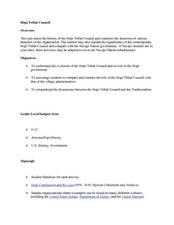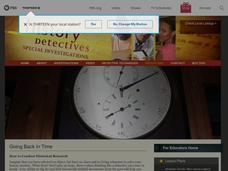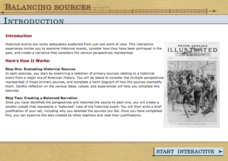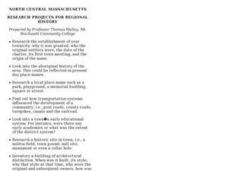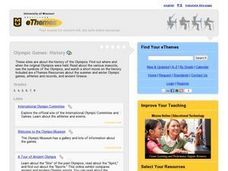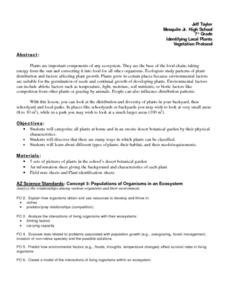Captain Planet Foundation
P is for Poppies
Explore the way local farming and rationing helped the war effort in World War I with a lesson plan on gardening. After learning about trench warfare, reading "In Flanders' Field" by John McCrae, and studying poppies, kids discuss the...
Curated OER
What Makes a Hero?
Here is a well-designed lesson inviting learners to consider the qualities of a hero. They describe the lives and deeds of national, state, and/or local heroes. This is a thoughtful lesson, which is part of a sequential group on heroes....
Curated OER
Hopi Tribal Council
Focusing on the differences between traditional Hopi government and the Hopi Tribal Council, this resource is a good addition to your unit on Native American culture. Learners conduct Internet research, analyze primary source photos, and...
PBS
Going Back In Time
History detectives eschew that time machine and follow the paper trail to go back in time to investigate an unfamiliar object. The goal is for class members to develop their skills as historical detectives.
Curated OER
Be a Building Detective!
Students participate in an in-depth study of a historic building in their community. They conduct a visual survey of the building, complete a worksheet, take a rubbing of the building, and research the history of the building.
Curated OER
Human Cloning: Is it Biological Plagiarism?
Is cloning good or harmful? Help your class understand the risks and benefits as they read, research, and discuss human cloning. Individuals form teams, research information, and present to the class before concluding with an in-depth...
American Museum of Natural History
Saving Species
Some scientists dedicate their lives to researching and protecting endangered species. An online lesson teaches about three scientists around the world who do just that. They learn about spiders, mollusks, and reptiles from North...
The New York Times
Investigating the Heroin and Prescription Opioid Epidemic
How bad is the opioid crisis in America? Has it gotten worse in the last few decades? Why? High schoolers delve into these questions with a thorough and thoughtful lesson from The New York Times on heroin prescription opioids. Starting...
Museum of Tolerance
Artifact Research Activity
Artifacts give us the privilege of learning about the past, may it be family, culture, or traditions. Here, class members learn about their family's past with the help of an artifact, or family heirloom. Once an artifact is discovered,...
Curated OER
Arabia: Educator's Resource and Activity Guide
MacGillivray Freeman's film Arabia presents viewers with remarkable images and insights into this ancient and mysterious land. An educator's guide is designed to provided teachers with the materials they need to support a showing of the...
Annenberg Foundation
Balancing Sources
Pupils turn into investigative reporters throughout history to learn what it takes to balance different primary sources on the same topic. They use what they learn to create a narrative based on their own interpretation of a historic...
Curated OER
Preserving the Memory
Young historians explore ways to help preserve historic battlefields and artifacts. Designed for secondary scholars, the resource focuses on Civil War battlefields and the National Registrar of Historic Places Application. Pupils also...
National Woman's History Museum
Creating a Historical Thesis Statement
A strong thesis statement not only identifies the subject of an essay but also presents a claim that must be supported with evidence. After researching how nursing has evolved in the United States since the Colonial era, young writers...
Curated OER
Creating a Primary Source Archive: All History Is Local
Students explore personal, local, state, and national history. In this historiography lesson, students search the Library of Congress digital collections for primary sources regarding their family histories framed in local, state, and...
Curated OER
European Festivals
Students explore the diversity of European festivals. In this cultural diversity lesson, students visit selected Web sites to research ancient festivals, the Edinburgh Fringe, and the Glastonbury. Students may organize their own festivals.
Curated OER
Genealogy Research
Personalize history through genealogy. Get your scholars examining their family's past by utilizing resources at your local genealogical society. Learners complete family pedigree charts and choose to do one of the following: research...
Curated OER
Genealogy Research
Students explore history is not as a listing of dates, wars, and leaders but as the story of real people whose lives were impacted by the events of their time. They complete a pedigree chart and tape record a family member.
Curated OER
Research Projects for Regional History
Young writers of any grade level research a historical topic of their choice about their local community. Using primary sources, they examine the historical significance of their area. They participate in activities such as going on a...
Curated OER
Olympic Games: History
Students use the internet to research the history of the Olympic Games. They identify the mascots and symbols of the Games. They watch a short video on the types of sporting events as well.
Curated OER
Roe v. Wade: A History of Controversy
Students research what is legal now as far as abortions are concerned. Does it matter what state you live in? Does it matter how old you are? If you are a teen, does the doctor have to notify your parents? Students prepare a panel...
Curated OER
U.S. History: Antebellum Heroes and Villains
Eighth graders research and write reports on key figures of the Antebellum Period. The projects also include pictures, bibliographies, and timelines about their assigned figure. In addition, 8th graders present oral reports to classmates.
Curated OER
Nous Nous Souvenons: French-Canadians
Students research the French-Canadian influence in northern New York. They interview families of French-Canadian descent, research immigration history, visit a French restaurant, write narratives about their experiences interviewing...
It's About Time
Plate Boundaries and Plate Interactions
How does the Earth continually repair itself? Explore the answer to this question, and others, with a unit on plate boundaries and interaction. Pupils classify the types of movement at plate boundaries and identify the distribution of...
Alabama Learning Exchange
Imaginary Numbers? What Do You Mean Imaginary?
Don't worry, this resource actually exists. Scholars learn about imaginary numbers and work on problems simplifying square roots of negative numbers. As an extension, they research the history of imaginary numbers.




